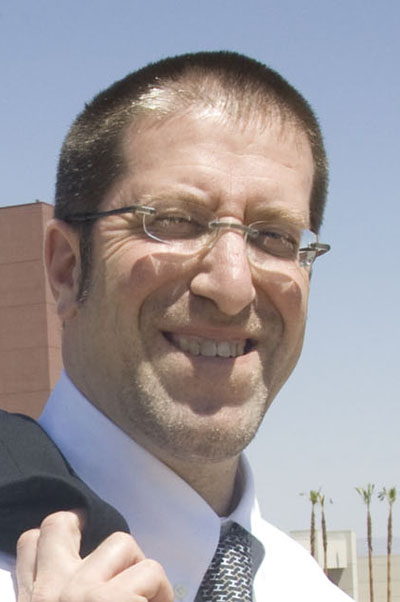Welcome not what doctor ordered
In April, as he visited Las Vegas, Dr. Howard Hack thought he saw his future clearly.
He would move from Wisconsin to Las Vegas with his family in June, he said, and begin a solo gastroenterological practice near Centennial Hills Hospital in July.
The vibrant Jewish community of Las Vegas, he said, would soon give him, his wife and their children the kind of social and spiritual support they can't find in Milwaukee.
"It should work out wonderfully," he said April 27 as he stood near what he believed would be his new office. "There's a real need for my speciality here."
But Hack and his family aren't in Nevada.
"I ran into some issues," he said recently in a long distance phone call from the Midwest.
Given the longtime scarcity of gastroenterologists in Southern Nevada, compounded by the suspensions of two physicians' licenses in the wake of the recent hepatitis outbreak, you would think a well-trained specialist with a clean bill of professional health wouldn't have many hurdles to overcome on his way to performing colonoscopies in the desert.
However, a seemingly slow moving bureaucracy coupled with physicians apparently worried that new competition would affect their pocketbooks, have made Hack's desired move more difficult than he imagined.
"It isn't easy to understand. It seems the need for gastroenterologists is obvious," said Hack, whose undergraduate work at the University of Pennsylvania was followed by medical school at the Washington University School of Medicine.
He further trained at Stanford University and the Cleveland Clinic, long ranked as one of the nation's top hospitals.
According to the American Medical Association, Nevada has 2.5 gastroenterologists per 100,000 residents, well below the country's ratio of four per 100,000. Thirty of the specialists now practice in Southern Nevada.
Though health officials have long said not enough physicians are being trained in the speciality, it is also true, Hack said, that the most desired places to live in the country have a higher ratio of the specialists, contributing to other areas being underserved.
"San Francisco has more than enough GI docs," Hack noted. "If I had tried to work there when I got out of Stanford, I probably would have had to wait tables to make a living."
Last October, four months before public health authorities found that reused syringes were tainting vials of anesthesia at Dr. Dipak Desai's clinic, Hack applied to the Nevada State Board of Medical Examiners for a medical license.
Not until June, nearly nine full months later, was he approved.
"That seemed much too long for a process that basically is just having documents sent in to prove where you worked and went to school," he said.
But board member Jean Stoess said a "rigorous investigation" of applicants, including fingerprint checks and a background check with the FBI and the state, makes a six- to nine-month wait for licensing common.
"We're more strict than other states," Stoess said.
In Arizona, it usually takes "30 to 60 days, 90 at the outside," for a physician to get his license, according to Roger Downey, a spokesman for the Arizona Medical Board. But the criminal checks are not as extensive.
"We don't get fingerprints," Downey said.
Although Hack concedes that his delay in licensing could be the result of bureaucrats "just doing their jobs in the best way they know," he said what is more difficult to understand is "the lack of collegiality in the medical community."
Hack said he could not find other gastroenterologists willing to provide "call coverage" for his planned practice in Las Vegas. In other words, when he went on vacation or wanted some time off, no other physician would agree to cover his patients should they need medical care.
"I found that very difficult to understand," he said.
Hack said finding call coverage is not a problem in Milwaukee, which he said has between 50 and 60 gastroenterologists to serve a population of 1 million.
He also said friends in the profession in both Long Beach and Santa Monica, Calif., told him finding call coverage was not a problem there for new practitioners.
Hack said no gastroenterologist came right out and told him he wasn't welcome in Las Vegas because he would cut into their profit margin, but he suspects that "if it's not the whole reason, it's a significant factor."
Dr. Julian Lopez, a gastroenterologist, agrees.
"We don't have a collegial medical community," said Lopez, who hasn't met Hack. "It's basically every man for himself."
Asked if money was a major reason why other physicians would not appear to support Hack's solo practice, Lopez replied: "Without question."
"Physicians have to make a living, too," Lopez said.
According to Salary.com, the median yearly salary of a gastroenterologist in Las Vegas is more than $326,000 a year, $23,000 higher than the median salary for the specialty in the United States.
Twenty-five percent of the gastroenterologists in Las Vegas, according to Salary.com, earn $400,000 or more per year.
Despite his difficulties in moving, Hack still seems intent on living in Las Vegas.
Hack now plans on becoming part of Dr. Frank Nemec's practice in September or October, a year after he submitted the application for his license. Hack and Nemec have a verbal agreement that still must be worked out.
"He'll be a great addition to the medical community," Nemec said.
Because the change in plans will practically run into the beginning of the school year, the rest of Hack's family won't immediately join him.
"I thought we would all be in Las Vegas this summer," Hack said. "The most difficult thing of all this will be having to be away from my family. Don't let anybody tell you it's easy for a doctor to move to Las Vegas."
Contact reporter Paul Harasim at pharasim@reviewjournal.com or 702-387-2908.

















